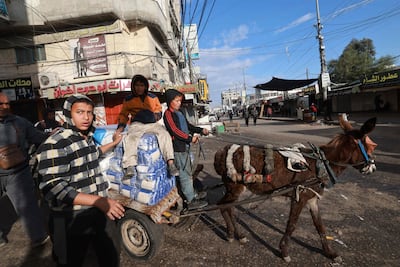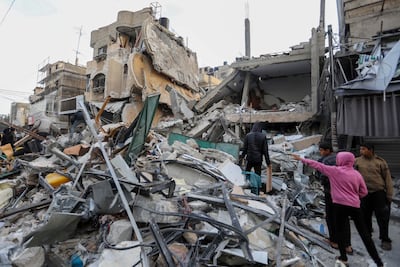Live updates: Follow the latest news on Israel-Gaza
Gazans have reacted angrily to a US air drop of aid over the weekend, saying the 38,000 meals supplied is a tiny fraction of the enclave’s requirements after 150 days of siege that have left 2.3 million people facing famine.
A senior diplomat from a G7 country, speaking off the record, told The National that the US has asked its allies to participate in the air drops, but that the majority are pushing for more aid to go through Rafah.
“What the Americans are doing is symbolic. Other countries might join in the air drops to help Washington politically, but there is no substitute for overland supplies,” the diplomat said.
Gazans who spoke to The National said the small amounts of aid with parachutes dropped by US planes led to a potentially dangerous scramble for the food. Images posted on social media showed heavy pallets of aid falling quickly near crowds of people, which experts on aid drops say posed a risk to life on the ground.
Some said they would not seek such aid as it was not worth the difficulty and humiliation of rushing to access supplies.
Mohammed Al Firi, who fled to Rafah from Gaza city, said he witnessed the American airdrop but was unable to receive any aid.
"Only those who can run and follow the parachutes can receive aid. Otherwise, no one else can access this aid," Mr Al Firi told The National.
"The aid is supposed to enter through the border, as this current method does not help people. On the contrary, it harms them, as some individuals get injured due to the pushing and shoving," he added.

Famine risk
Despite the air drops, the situation in Gaza is growing more desperate each day. Gazan Ministry of Health spokesman Ashraf Al Qudra announced on Sunday that the number of children who have died due to drought and malnutrition in northern Gaza has risen to 15.
Aid agencies say a leading factor in the crisis is laborious Israeli inspection of aid lorries at the main crossing point, Rafah, on the Egyptian border, which has resulted in an average of just 100 lorries making it into Gaza per day, half of what the UN says is the bare minimum needed.
The conflict, including Israeli attacks on Hamas policemen escorting aid convoys, has also curtailed the movement of supplies, especially in the north of the enclave where residents have eaten weeds, sifted through rubbish for food and eaten animal fodder.
More than 127 Palestinians were shot dead by Israeli forces on Friday as they struggled to access lorry loads of aid, in an incident now being investigated by the EU and Amnesty International.
Hussein Murtaja, 36, in the Al Jinina neighbourhood in the city of Rafah in the south of the Gaza Strip, said the images of Gazans struggling to access the air dropped supplies, some of which landed in the sea, were depressing.
Mr Murtaja has been displaced twice, first from Gaza city to Khan Younis, and then from Khan Younis to Rafah. "I can’t sleep. Seeing my people running after the aid is breaking my heart. We need people who live among us, feel our pain, and experience our suffering to help decide our fate," Mr Murtaja told The National.
Mr Murtaja, an executive director for the NGO Gaza Group for Culture and Development Centre, wanted to cry but remained strong in front of his children.
"We dreamt and wished for a dignified life, but we find ourselves in strange streets, cold tents and endless nightmares.”

Ghazi Jamal, 26, from Gaza city, said the amount of air dropped was minuscule.
"This does not meet the minimum requirements of the population in Gaza ... its purpose is for display and to lift the embarrassment and blame," Mr Jamal told The National.
Mr Jamal was referring to accusations that the US shares responsibility for Gaza's suffering due to its support for Israel’s war and its failure to pressure Israel into allowing more aid into Gaza overland.
Although part of Mr Jamal's house is damaged, he remains there with eight other members of his family.
"People in the north of Gaza are suffering from hunger and fatigue, feeling as if they are drowning people clinging to a straw. When this aid was distributed, the residents followed them to get scraps of aid to meet some of their needs, but most returned with nothing, feeling broken-hearted," he added.
Ali Loai, a 29-year-old from Gaza city who is currently living in a tent in Rafah with five other family members, explained that he would not try to receive any of the aid.
"I will not chase after the aid, because we are better than that. Our situation is so difficult, and the prices are so high, and I cannot fulfil all of my family's needs. At the same time, I will not fight with others to get a small package that will not be sufficient for us," Mr Loai told The National.
"I wonder why America is utilising air drops when they could pressure Israel to allow aid trucks to enter Gaza through the Rafah border. In this way, we could receive aid in a dignified manner," he added.
In nearby Jordan, the Royal Palace quoted King Abdullah as saying his government “will keep pushing to stop the war and provide humanitarian, emergency and medical aid to Gaza by land and air”.
The palace reported that King Abdullah told Ayman Odeh, an Arab member of the Israeli Knesset, that “maximum effort has to be exerted to reach a ceasefire in Gaza and protect the civilians.”

